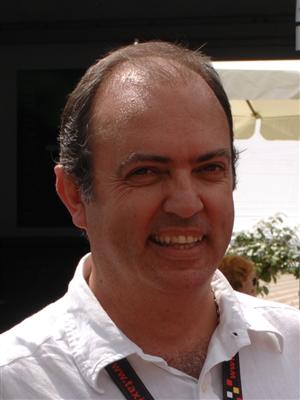It makes any sense to create a film festival in Portugal?
HT: In Madeira makes sense. In fact I think the island is the ideal location to have the greatest film festival in Portugal. It has the proper conditions in terms of logistics, beauty and climate. It is a tourist destination. I know other festivals held at national level and have absolutely nothing to do, the Luso-Brazilian, Fundão, avanca and Vila do Conde, which already exist and cannot be compared with Madeira. With the exception of Fantasporto, with more than 30 years, has a great reputation out there. The concept of island is romantic. I think it's much more appealing and attractive to people wanting to go to a tourist region to see a film festival and participate in it.
The idea of creating a film festival in Madeira became somehow from the lack of good cinema, completely subdued by the American features?
HT: It was basically the reason that led us to create the festival. The cinemas theaters only show what I call the fast food of Hollywood that's all and we must oppose this offer. It is necessary to show people that there are fantastic European productions, even here. This in fact is the interest of offering the people of Madeira contrast of what they are accustomed. Coupled with this aspect, we have the tourist component that is very interesting if properly worked, that is supported.
As director of a festival that has seen much films, you see in terms of national film production, there is an improvement, an evolution, or is still much work to be done?
HT: I think is more thoroughly professional from does that make it. I note that the emergence of digital has facilitated the lives of young filmmakers who cannot any kind of financial support, either through the cinema and audiovisual institute, they can create with a good low-budget a good work. Risk in their projects because they believe in their capabilities and in fact produce films with high quality and some notoriety abroad, despite the strong oppression to which they are subjected by the marketing of American cinema that leaves no room for the placement of Portuguese cinema in movie theaters. I think television should support more. There was a time when the SIC had many co-productions showed much national cinema and today is not so much. I notice a setback. Often appear in foreign productions. It is from these festivals that comes the opportunity to buy the rights to display this work and this often happens in France, Spain and some in Germany. I have a program that I do not like to highlight. I like to make references and short films there is competition "North Atlantic", which is a co-production between England and Portugal, the director is from Madeira, Bernardo Nascimento, I think is quite delicious. It is a very well done movie and it's been reaping a huge success in the major world festivals. He was awarded the U.S.. This shows what? You can create a project with high quality, based on real news, write a script and with great dedication and little money make a great movie.
In terms of European cinema, until recently, it was said that he was dying. Do you agree with this statement?
HT: No, no way. I would not say it is gone, what I think is that we have visibility and therefore the justification for holding a festival to show what is done here. The same justification for the growth of domestic production also applies to European cinema. The use of digital camera, its ease of handling, came to promote a greater filmmaking. It is much cheaper, the film died, disappeared. Become blurred and on the other hand, the bureaucracy that existed between authors and channels to support the films. Now they almost do it without such support. The mentality is: we have a project, we will seek financing somewhere and does not need too much money to do a great work. The increased production of movies is good, as well as bad. There are very bad movie, because increased the amateurs films. It is a question of scale in the fifty submissions we received we only selected six films. Currently there are 400 films, 300 of which are bad and only show the rest, but increased the choice of making a good selection. European cinema is healthy. You can also extract elations through the European film awards, the Oscar of Europe, there is greater consistency, it's becoming attractive and there is a closer union of European filmmakers.
New technology does not dictate the extinction of the festivals in the future? People increasingly download movies from the internet and blogs eventually replace film critics and experts.
HT: I think that there is nothing at stake. It's a shame and a crime piracy exists. On another matter, a film festival is different from a trip to a movie theater, which will likely have an interval, which is inconceivable for this type of event, leave the work of a filmmaker in the middle. Secondly, there is the presence of the filmmakers, some elements of the artistic and technical teams that allow people to listen to lectures with these professionals, take questions and then there is a festive atmosphere that allows the inclusion of other aspects of artistic expression. It is the seventh art, because it covers all other forms of art. It is normal in a big-budget festivals, have live music, exhibitions and workshops, everything has its place in cinema. This festival hopes to achieve that.









